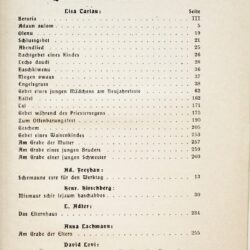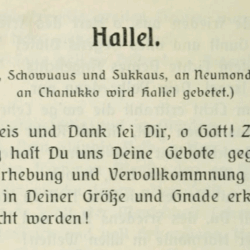This is Max Grunwald’s anthology of teḥinot and paraliturgical prayer, Beruria: Gebet- und Andachtsbuch für jüdische Frauen und Mädchen (1907), containing contributions from 32 authors in total. While the majority of the prayers were written by Grunwald, thirty-two were composed or offered in adapted translation by Lisa Tarlau (1879-1952), and other women are also credited for their contributions. The author credits are provided along with the Table of Contents at the end of the volume. Substantial changes were made in the revised second edition (1909) including an adapted translation of Hallel by Tarlau.

This work is in the Public Domain due to its having been published more than 95 years ago.
This digital edition was prepared from page images made by the University of Toronto and shared through the Internet Archive. (Thank you!)
As an introduction to the work, we have transcribed the Preface. The transcription of the German provided machine-readable text for machine translations by DeepL, which we then edited for accuracy and clarity. We welcome any/all corrections, improvements, and additional transcriptions and translations of this work’s contents. –Aharon Varady
Source (German) Translation (English)
Source (German) Translation (English)
Source (German) Translation (English)

“📖 Beruria: Gebet- und Andachtsbuch für jüdische Frauen und Mädchen, by Rabbi Dr. Max Grunwald (1907)” is shared through the Open Siddur Project with a Creative Commons Attribution-ShareAlike 4.0 International copyleft license.











Leave a Reply